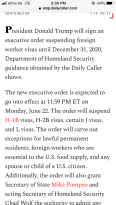The previous ban has been extended. DV was included in the previous ban......
In Proclamation 10014 of April 22, 2020 (Suspension of Entry of Immigrants Who Present a Risk to the United States Labor Market During the Economic Recovery Following the 2019 Novel Coronavirus Outbreak), I determined that, without intervention, the United States faces a potentially protracted economic recovery with persistently high unemployment if labor supply outpaces labor demand. Consequently, I suspended, for a period of 60 days, the entry of aliens as immigrants, subject to certain exceptions. As I noted, lawful permanent residents, once admitted pursuant to immigrant visas, are granted “open-market” employment authorization documents, allowing them immediate eligibility to compete for almost any job, in any sector of the economy. Given that 60 days is an insufficient time period for the United States labor market, still stalled with partial social distancing measures, to rebalance, and given the lack of sufficient alternative means to protect unemployed Americans from the threat of competition for scarce jobs from new lawful permanent residents, the considerations present in Proclamation 10014 remain.
In addition, pursuant to Proclamation 10014, the Secretary of Labor and the Secretary of Homeland Security reviewed nonimmigrant programs and found that the present admission of workers within several nonimmigrant visa categories also poses a risk of displacing and disadvantaging United States workers during the current recovery.
American workers compete against foreign nationals for jobs in every sector of our economy, including against millions of aliens who enter the United States to perform temporary work. Temporary workers are often accompanied by their spouses and children, many of whom also compete against American workers. Under ordinary circumstances, properly administered temporary worker programs can provide benefits to the economy. But under the extraordinary circumstances of the economic contraction resulting from the COVID-19 outbreak, certain nonimmigrant visa programs authorizing such employment pose an unusual threat to the employment of American workers.
For example, between February and April of 2020, more than 17 million United States jobs were lost in industries in which employers are seeking to fill worker positions tied to H-2B nonimmigrant visas. During this same period, more than 20 million United States workers lost their jobs in key industries where employers are currently requesting H-1B and L workers to fill positions. Also, the May unemployment rate for young Americans, who compete with certain J nonimmigrant visa applicants, has been particularly high — 29.9 percent for 16 19 year olds, and 23.2 percent for the 20-24 year old group. The entry of additional workers through the H-1B, H-2B, J, and L nonimmigrant visa programs, therefore, presents a significant threat to employment opportunities for Americans affected by the extraordinary economic disruptions caused by the COVID-19 outbreak.
As I described in Proclamation 10014, excess labor supply is particularly harmful to workers at the margin between employment and unemployment — those who are typically “last in” during an economic expansion and “first out” during an economic contraction. In recent years, these workers have been disproportionately represented by historically disadvantaged groups, including African Americans and other minorities, those without a college degree, and Americans with disabilities.
In the administration of our Nation’s immigration system, we must remain mindful of the impact of foreign workers on the United States labor market, particularly in the current extraordinary environment of high domestic unemployment and depressed demand for labor. Historically, when recovering from economic shocks that cause significant contractions in productivity, recoveries in employment lag behind improvements in economic activity. This predictive outcome demonstrates that, assuming the conclusion of the economic contraction, the Unites States economy will likely require several months to return to pre-contraction economic output, and additional months to restore stable labor demand. In light of the above, I have determined that the entry, through December 31, 2020, of certain aliens as immigrants and nonimmigrants would be detrimental to the interests of the United States.
NOW, THEREFORE, I, DONALD J. TRUMP, President of the United States, by the authority vested in me by the Constitution and the laws of the United States of America, including sections 212(f) and 215(a) of the Immigration and Nationality Act (INA) (8 U.S.C. 1182(f) and 1185(a)) and section 301 of title 3, United States Code, hereby find that the entry into the United States of persons described in section 1 of Proclamation 10014, except as provided in section 2 of Proclamation 10014, and persons described in section 2 of this proclamation, except as provided for in section 3 of this proclamation, would be detrimental to the interests of the United States, and that their entry should be subject to certain restrictions, limitations, and exceptions. I therefore hereby proclaim the following:
Section 1. Continuation of Proclamation 10014. (a) Section 4 of Proclamation 10014 is amended to read as follows:
“Sec. 4. Termination. This proclamation shall expire on December 31, 2020, and may be continued as necessary. Within 30 days of June 24, 2020, and every 60 days thereafter while this proclamation is in effect, the Secretary of Homeland Security shall, in consultation with the Secretary of State and the Secretary of Labor, recommend any modifications as may be necessary.”



